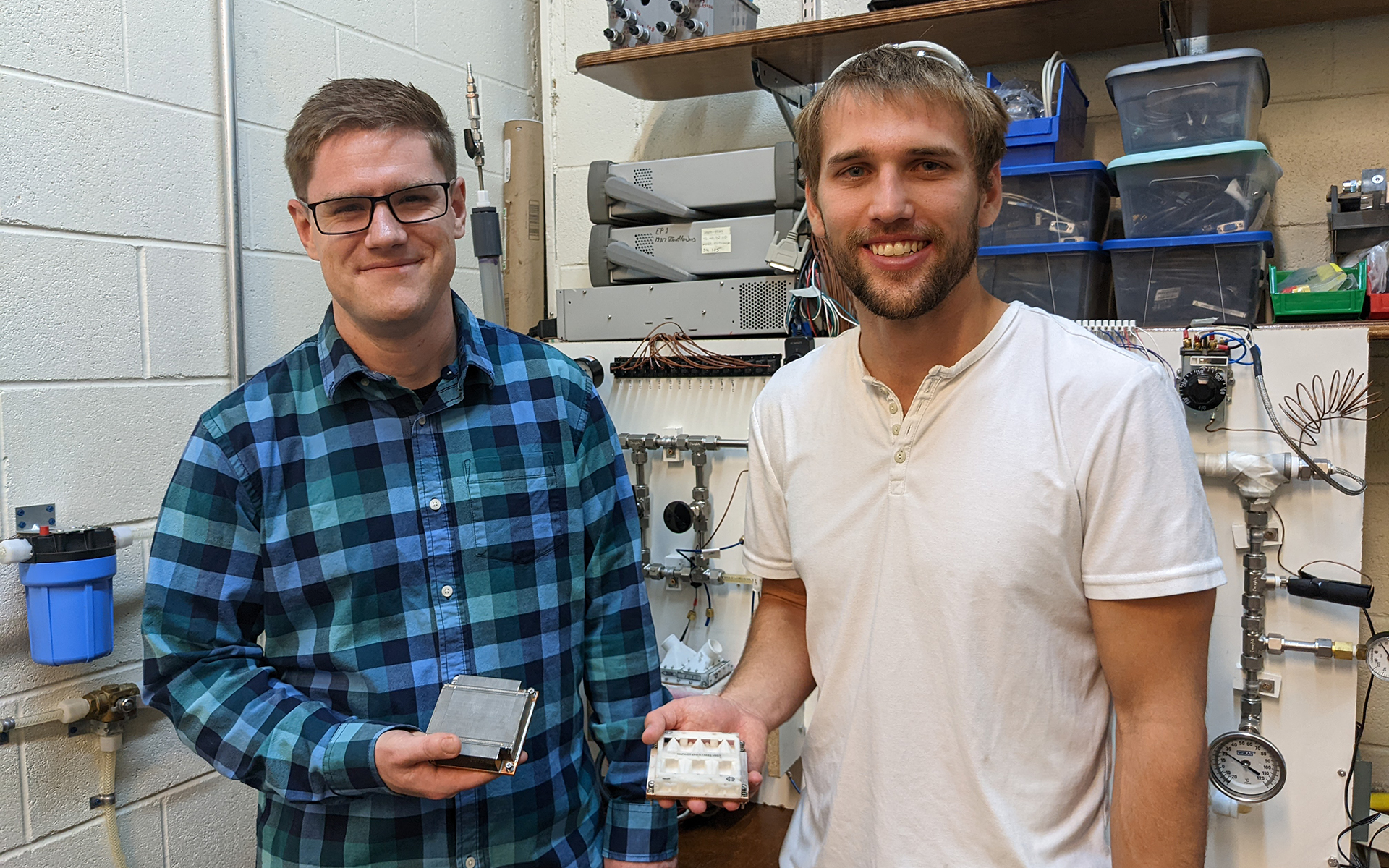The modern world is ruled by data: every Google search, every bank transaction, every Zoom meeting. And every minute, all that data is processed through massive data centers, which consume huge amounts of electricity and require energy-intensive cooling systems to keep servers from overheating.
The problem of cooling data centers efficiently is being solved by an engineering team from Colorado State University. As a CSU mechanical engineering undergraduate back in 2015, David Hobby started thinking about focusing not on the data centers themselves, but on the chips and microprocessors that produce the heat. That idea and subsequent product line morphed into a startup company called Impact Cooling, which will soon be housed at the CSU Energy Institute. Working with Zach Gilvey, also a recent CSU graduate, the team has received a critical boost from an organization that mentors and springboards great technologies into marketable ones.
This year, Hobby and Gilvey are among 39 new Activate Fellows, awarded by the national nonprofit Activate.org from an initial pool of more than 500 applicants. Fellows receive a living stipend, travel allowances and other benefits to enable them to focus on their projects full-time and bring their products and ideas to commercial fruition. Each project also receives $100,000 in research funding giving entrepreneurs access to tools, equipment, facilities and expertise. Hobby and Gilvey are “Activate Anywhere” Fellows, meaning they can work from anywhere within the U.S.
What’s the best way to cool data centers?
By some estimates, data centers are on track to consume 8% of global power by 2030. Impact Cooling’s core technology is a direct-to-chip cooling solution that can reduce data center power consumption by more than 33% without the use of conditioned air or evaporated water.
The technology involves the adaptation of a process called jet impingement, in which the surface of the chip is cooled by thousands of microscopic jets of air that quickly strip heat away from the surface.
“We’ve been able to demonstrate 10 times improvement in heat transfer at the chip, compared to what conventional methods are capable of doing,” Hobby said. The innovation eliminates demand for air conditioning an entire room of servers.

Zach Gilvey and David Hobby in the lab at Powerhouse Energy Campus, with one of the Impact Cooling devices.
Hobby and Gilvey are both former students of Todd Bandhauer, associate professor in the Department of Mechanical Engineering, who is a company co-founder along with J. Cliff Denson, who has worked with the team on product and business development.
Bandhauer said Impact Cooling is a perfect representative of what his lab is about – applying fundamental science to real problems, with real market value. It also speaks to the larger university environment where the company was conceived, from the CSU Energy Institute’s roots in entrepreneurship and climate-focused innovation, to the support the team received from CSU Ventures and the College of Business.
Both Hobby and Gilvey participated in Professor Scott Shrake’s Venture Accelerator in the College of Business. The entire team, including Bandhauer, also went through CSU Ventures’ Launchpad FUEL program that was funded by the National Science Foundation i-Corps program. The team received additional support from Colorado’s Office of Economic Development and International Trade.
Bandhauer called the Activate program, and others like it, “critical for America” because it allows entrepreneurs like his former students to take big risks.
“To me, one of the most important impact of the program is that it provides early-stage support to entrepreneurs without having the pressure of getting a full time job or being supported by a wealthy family member,” Bandhauer said.
“Being in the Activate fellowship means we can make a change in the real world much quicker than we would have otherwise,” Gilvey added.
Another CSU startup company, Cypris Materials, was supported by an Activate Fellowship in 2019.